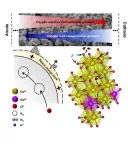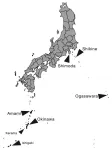(Press-News.org) Political anger and cynicism are rising in the United States and in many democracies worldwide, and both are associated with exposure to political attacks on social media, a new University of Michigan study shows.
Americans use social media to find information and news about politics, but much of the content they see in their feeds is hostile, uncivil and attacking, said lead author Ariel Hasell, assistant professor of communication and media and an affiliate of the Center for Political Studies at the U-M Institute for Social Research.
Hasell and colleagues investigated whether exposure to political attacks on social media is associated with political cynicism, and if so, whether emotions like anger and anxiety play a role in this process.
They found that people who were exposed to more political attacks on social media were more politically cynical, and that perceived exposure to these attacks was associated with more anger about the state of the U.S., which was subsequently related to greater levels of political cynicism.
Their results, based on a panel survey of 1,800 American adults fielded during the 2020 election, were recently published in the International Journal of Press/Politics.
"It's important to understand how feelings of cynicism emerge because we're seeing many democratic governments facing crises of legitimacy," Hasell said. "Our findings provide some of the first evidence of how exposure to political attacks on social media might relate to political cynicism in the context of a U.S. presidential election."
Cynicism in a democracy
Hasell and colleagues define political cynicism as an attitude that's rooted in distrust of political actors' motivations. It goes further than healthy skepticism, they say, because it involves wholesale rejection of people and processes in democracy, and an underlying belief that politicians are guided by corrupt, self-serving, personal interests, rather than service to the public good.
"Cynicism can be a rational response to actual corruption and breaches of trust by those in power," said Audrey Halversen, doctoral student in the Department of Communication and Media. "But it is a matter of concern among scholars of democracy because of its potential to delegitimize democratic processes, reinforce negative attitudes, distort people's interpretations of political information, and cause some citizens to withdraw from politics."
Pew Research Center polls show the American public's confidence in government has reached its lowest point in decades, and perceptions that self-interest and corruption are guiding government action have bred cynicism across the political spectrum. The U-M study tested the theory that this increase in cynicism might be linked to political social media use.
Social media influence
Political content on social media is often toxic, and we can expect to see political hostility surge online this summer and fall as we approach the presidential election, Hasell said.
Prior research has shown that political attacks communicated by independent actors (rather than candidates) can be especially influential in shaping political beliefs. Social media algorithms reward and amplify attacks precisely because they're engaging. Studies show this makes outrage more potent and visible, giving users a warped view of what the public believes.
"If your main source of news is social media, you are more likely to perceive politics as hostile and angry," Hasell said. "And beyond the feelings that political attacks provoke, it matters how people perceive and read the temperature of 'public emotions' because this can impact assessments about the country's well-being and its ability to solve problems and accomplish goals."
The panel survey in the U-M study asked participants about their social media usage and whether they had been exposed to political attacks against Trump and Republicans, or against Biden and Democrats, on social media. It included a set of questions to measure political cynicism among respondents, and asked about their feelings about the state of the U.S. as a country.
Anger and anxiety
Public anger in American politics has reached a fevered pitch in the last decade, and data show it is rising among American voters heading into the first presidential election since the Jan. 6 attack on the Capitol.
An 2019 NBC/Wall Street Journal poll found nearly 7 in 10 Americans reported being angry about the political establishment and a 2023 survey by the Public Religion Research Institute showed that about a quarter of Americans agree that "true American patriots may have to resort to violence in order to save our country.” This is up from 15% in 2021.
Anxiety is another negative emotion, which can be elicited by uncertainty, risk aversion and threats, especially if they are vague, unknown or perceived to be beyond one's control, the researchers said. Political fearmongering and social media toxicity can drive anxiety during a presidential election by creating uncertainty about political outcomes and by creating a generalized sense of political hostility that is beyond an individual's control.
"Negative emotions are not necessarily bad for democracy," Hasell said. "Emotions like anxiety and anger can drive people to the polls, motivate advocacy, and get people to seek and think more deeply about political information. But relentless negativity about the state of a country 'under threat' can also make people frustrated, disgruntled and disengaged. Anger can affect our ability to see things as they are, and make measured decisions that are important in a democracy."
A 'concerning' cycle
The study found evidence that exposure to political attacks on social media contributes to anxiety, anger and political cynicism, but that anger is the emotion that relates to cynicism.
"As more people turn to social media for news and information, it's likely that they'll be more repeatedly exposed to political attacks, which may further promote political cynicism," Hasell said. "This is concerning because cynicism can make it harder for people to make sense of political information. It can lead people down a road of apathy and disengagement, or toward fringe parties and antidemocratic forms of participation."
Can citizens who use social media do anything to break that pattern?
"An easy way to avoid getting angry and cynical is to be mindful about focusing on nonhostile, civil dialogue," Hasell said. "If you are seeing a lot of hostility in your social media, you can think about re-curating and unfollowing people who are fomenting this kind of hostility. We don't find that social media use in itself is making people angry and cynical, it has to do with how we decide to use it."
Brian Weeks of the U-M Department of Communication and Media and Center for Political Studies at the Institute for Social Research was also a co-author on the Michigan study.
Study: When social media attack: How exposure to political attacks on social media promotes anger and political cynicism
Written by Tevah Platt, Institute for Social Research
END
Political rage on social media is making us cynical
2024-03-11
ELSE PRESS RELEASES FROM THIS DATE:
Emergency room culture may deter medical students from selecting specialty
2024-03-11
FINDINGS
In a new UCLA Health study, 25 medical students pursuing emergency medicine were interviewed about their experiences working in an emergency room during clinical rotations. Four themes were identified in their answers: watching difficult interactions between patient and care team and among the care team was distressing; women participants found that culture to be exclusionary; traits – like assertiveness and self-advocacy – were favored; and access to mentors, representation, and exposure to environment influenced interest towards the specialty. Most of the medical students interviewed -- 21 ...
CPRIT grant supports UH College of Pharmacy fight against rare genetic disorder
2024-03-11
The University of Houston College of Pharmacy is included in a $68.5 million funding package from the Cancer Prevention and Research Institute of Texas (CPRIT).
Ming Hu, Diana S-L. Chow Endowed Professor of Drug Discovery and Development, and Gregory Cuny, Joseph P. & Shirley Shipman Buckley Endowed Professor of Drug Discovery, received $1.4 million to fight familial adenomatous polyposis (FAP), a devastating and rare genetic disorder of the gastrointestinal tract that can cause hundreds or thousands of polyps inside the colon ...
Trauma screening may improve mental health service recommendations for children
2024-03-11
UNIVERSITY PARK, Pa. — Each year between 200,000 and 270,000 children and youth enter foster care placements with child welfare services, and many more children receive child welfare services while remaining in their parent's care, according to the U.S. Department of Health and Human Services. Although many of these children have a documented history of abuse or neglect, children may respond differently to incidents of maltreatment or other potentially traumatic events. Incorporating a trauma screening — which assesses how trauma and maltreatment affected each child — into the child welfare evaluation process provides information that could be used to ...
Wrist device that monitors activity could help provide early warning of Alzheimer’s
2024-03-11
Monitoring daily activity patterns using a wrist-worn device may detect early warning signs of Alzheimer’s disease, according to a new study led by researchers at the Johns Hopkins Bloomberg School of Public Health.
The researchers analyzed movement data from wristwatch-like devices called actigraphs worn by 82 cognitively healthy older adults who were participants in a long-running study of aging. Some of the participants had detectable brain amyloid buildup as measured by PET scan. Buildup of the protein amyloid beta in the brain is a key feature of Alzheimer’s disease.
Using a sensitive statistical technique, the ...
Synergistic proton and oxygen-ion transport in fluorite oxide-ion conductor
2024-03-11
They published their work on new superionic mechanism in fluorite oxide electrolyte for low temperature protonic ceramic fuel cells in Energy Material Advances.
"The development of low-temperature and high-performance solid oxide fuel cells is imperative." said corresponding author Dr. Jianbing Huang, Associate Professor of the State Key Laboratory of Multiphase Flow in Power Engineering, Xi'an Jiaotong University.
Dr. Huang explained that protonic ceramic fuel cell has several significant advantages as an alternative solid oxide fuel cell ...
Complex chemistry in the cold depths of space (video)
2024-03-11
WASHINGTON, March 11, 2024 — For years, scientists thought some complex molecules could only be formed on Earth. But what if we found these kinds of molecules out in space after all? In this episode of Reactions, we explore new findings that show complex carbon ring structures can be formed in space, and what that might mean for biology, chemistry and our own chemical history! https://youtu.be/Jh_O5JP10aQ?si=HFvdSchFY95y4idV
Reactions is a video series produced by the American Chemical Society and PBS Digital Studios. Subscribe to Reactions at http://bit.ly/ACSReactions and follow us on Twitter @ACSReactions.
The ...
TaskMatrix.AI: Making big models do small jobs with APIs
2024-03-11
A research team at Microsoft has designed an efficiency tool called TaskMatrix.AI that can be used to accomplish a wide variety of specific AI tasks. TaskMatrix.AI connects general-purpose foundation models like GPT-4, the model behind ChatGPT, with specialized models suitable for certain tasks — much like a human project manager. This research was published Feb. 16 in Intelligent Computing, a Science Partner Journal.
Foundation models and specialized models usually have different mechanisms thus are not easily compatible. Rather than modifying and integrating existing models, TaskMatrix.AI bridges the gaps between them through application ...
Turns out—male roundworms are picky when choosing a mate, new research finds
2024-03-11
A piece of rotting fruit is likely covered in hundreds if not thousands of microscopic roundworms, including C. elegans—a popular experimental model system for studying neurogenetics. With a lifespan of only a few weeks, C. elegans must reproduce quickly and often. The species is made up of hermaphrodites and males. The hermaphrodites have female bodies, can self-fertilize, and can mate with males. Recent research from of the Portman Lab at the Del Monte Institute for Neuroscience at the University of Rochester, found the males do not mate indiscriminately—they are selective about things like age, mating history, and nutrition.
“We ...
Anemonefish are better taxonomists than humans
2024-03-11
Anemonefish form mutualistic relationships with the sea anemones they live in and these associations are not random: some species such as the yellow-tail anemonefish (Amphiprion clarkii) are generalists and can live in almost any sea anemone, others like the tomato clownfish (Amphiprion frenatus) are specialists, living in only one sea anemone species, the bubble-tip sea anemone (Entacmaea quadricolor). Reasons for these preferences are unclear because we know very little about the genetic diversity of giant sea anemones.
Researchers at the Marine Eco-Evo-Devo Unit and Marine Genomics Unit at the Okinawa Institute of Science ...
Social determinants of health and redirection of care for infants born extremely preterm
2024-03-11
About The Study: In this study of 15,000 infants born extremely preterm, redirection of care discussions (withdrawal, withholding, or limiting escalation of treatment) occurred less often for Black and Hispanic infants than for white and non-Hispanic infants. It is important to explore the possible reasons underlying these differences.
Authors: Jane E. Brumbaugh, M.D., of the Mayo Clinic in Rochester, Minnesota, is the corresponding author.
To access the embargoed study: Visit our For The Media website at this link https://media.jamanetwork.com/
(doi:10.1001/jamapediatrics.2024.0125)
Editor’s ...





